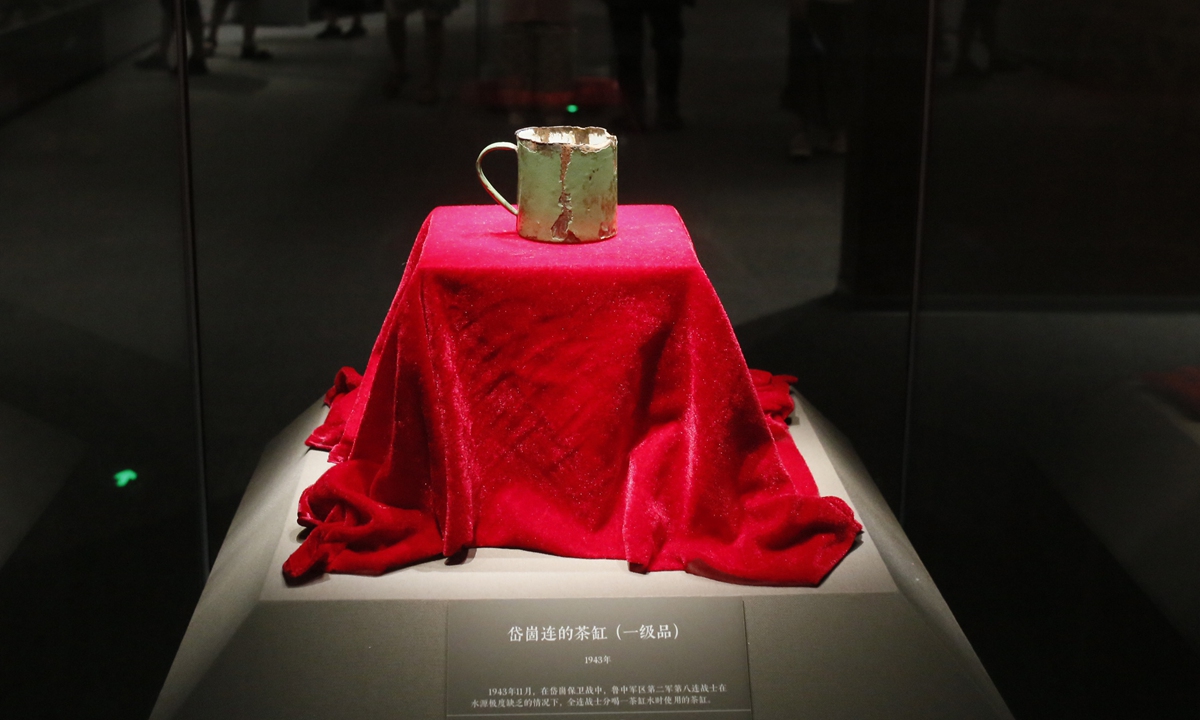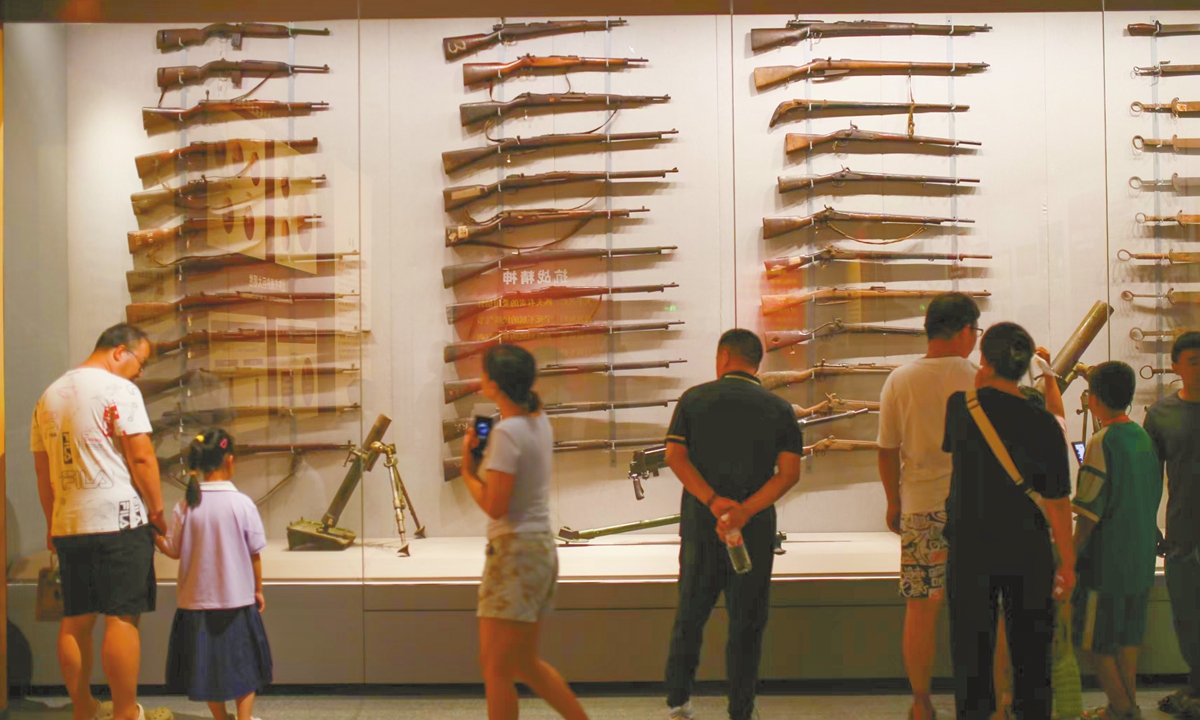Editor's Note:
The year 2025 marks the 80th anniversary of the victory in the Chinese People's War of Resistance Against Japanese Aggression and the World Anti-Fascist War. Though the smoke and flame of war has long faded, the memory of that chapter in history remains vivid. This special series, titled "Witness: War Relics Etch the Memory of Victory," traces the stories behind old photographs, battlefield relics, handwritten letters, and other precious artifacts and documents imbued with the spirit of the era.
Through these objects, we aim to illuminate the intersection of ordinary lives and national destiny, and to rediscover the enduring spirit forged in blood and fire. The series will feature field reports from museums, the homes of martyrs' descendants, and red archives across the country, weaving together a three-dimensional portrayal of wartime memory. It is both a heartfelt tribute to history and a solemn salute to peace.
This is the first installment in the series. In 1943, amid the rugged cliffs of Daigu Township in the Yimeng Mountains of East China's Shandong Province, a heroic company of Chinese soldiers, under the leadership of the Communist Party of China (CPC), mounted a valiant defense against invading Japanese forces - an extraordinary display of courage, sacrifice, and the indomitable Yimeng Spirit. Today, a battle-worn tin cup is the witness of this heroic legacy.

The enamel tin mug from the Daigu battle on display at an exhibition commemorating the 80th anniversary of the victory of the Chinese People's War of Resistance Against Japanese Aggression at the Shandong Museum, Jinan, East China's Shandong Province Photo: Shan Jie/GT
It's an unremarkable enameled tin mug - rusted, with peeling paint and a misshapen rim.
Yet it now rests with reverence on a piece of red cloth, encased in glass, as a centerpiece of the Shandong Museum's latest exhibition commemorating the 80th anniversary of the victory in the Chinese People's War of Resistance Against Japanese Aggression.
In the darkest days of the war, this mug passed between the hands of Red Army soldiers, sustaining their will to fight on.
In the mountainous county of Mengyin in Yimeng Mountain region in East China's Shandong Province stand two castle-shaped hills known as the Southern and Northern Daigu. During the war, they were the site of a fierce and legendary battle - the Defense of Daigu - that struck terror into the hearts of Japanese invaders.
In November 1943, 93 soldiers with the Eighth Route Army held their ground atop Daigu against thousands of Japanese and puppet troops.
After 15 days and nights of fierce combat, the soldiers of the 8th Company of the 3rd Battalion, 11th Regiment of the Eighth Route Army's Central Shandong Military District, successfully fulfilled their mission of pinning down the enemy, providing crucial support to the main forces fighting on the external front. At the cost of three lives and seven wounded, they achieved a remarkable victory against an enemy force more than 40 times their size - causing over 300 casualties and exhausting large quantities of enemy ammunition. It was a true miracle of defeating the many with the few, the Global Times learned from the Shandong Museum.
This humble mug accompanied soldiers of the now-honored "Heroic Daigu Company" through their most grueling days. It witnessed the blood and fire of the 1943 Daigu defense. Under relentless bombing and siege, the soldiers survived on just two jars of water per day, sometimes even quenching thirst with muddy ice, yet held their ground until a breakthrough was achieved.
Hung from the belt of a soldier who survived the final push, the mug today bears quiet testimony to their courage and endurance

The Daigu landscape in Daigu town, Mengyin county of East China's Shandong Province Photo: Courtesy of Mengyin publicity department
A brilliantly executed battle
In November 1943, as Japan's full-scale invasion of China entered its seventh year, over 20,000 Japanese and puppet troops launched a sweeping operation through the central Shandong region of Yimeng. Their goal: to "eliminate" the Eighth Route Army's forces and wipe out local resistance strongholds within three months, according to the Military Digest journal.
In response to this aggressive offensive, the Central Shandong Military District of the Eighth Route Army adopted an interior-exterior coordinated strategy. Orders were issued for the 8th Company and part of the 7th Company of the 3rd Battalion, 11th Regiment, to hold their ground at a critical gateway to the southern Yimeng mountains - the twin castle-shaped hills of Southern and Northern Daigu - to pin down the enemy and cover the main force's retreat.
These two hills, located in present-day northeast Mengyin county, are part of a rare "mountain mesa" landscape, with steep cliff walls and flat tops, of which the land formation is named after the local township of Daigu. Their natural fortifications were the origin of the saying "One soldier holds the pass against ten thousand."
On November 4, Eighth Route Army officer Zhang Dong led 93 soldiers up the hills and immediately began fortification. Working day and night, they dug trenches, built bunkers and watchpoints, and, with the help of local villagers, transported essential supplies - water jars, grain, and ammunition - up the cliff paths.
Though outnumbered and poorly equipped, the troops' morale was high. Many swore oaths like "As long as I live, the position will not fall," and some even submitted applications to join the CPC from the battlefield.
On November 10, the enemy's vanguard approached the hills. To lure them into a trap, the Eighth Route Army launched a series of skirmishes and feigned retreats. Over 3,000 Japanese and puppet troops followed, encircling Daigu. The main assault began on the early morning of November 13, with enemy troops scaling ladders to storm northern Daigu.
But the defenders waited calmly, then unleashed a sudden storm of gunfire, grenades, and boulders, forcing the attackers to retreat in panic. A similar fate awaited those who attempted to storm the southern hill.
As the battle wore on, the enemy escalated attacks: Artillery bombardment, airstrikes, poison gas, even coercing local villagers to shout surrender appeals. But the Eighth Route Army held the high ground, both literally and strategically.
During the day, they defended their position; at night, they launched ambushes. No matter how fierce the attacks, the enemy never breached the mountaintop defenses.
To sustain the defense, a detachment from the 7th Company slipped through enemy lines at night, delivering crucial supplies to the defenders in small batches.
After intense fighting, with over 300 enemy casualties, the Japanese forces still failed to seize Daigu. On the night of November 27, having completed their strategic task, all soldiers successfully broke through the siege and rejoined the main force - a decisive victory in the Defense of Daigu.
"I was just 6 when the Japanese came, and we all had to flee," recalled 86-year-old Xu Zhiben, who still lives in the village beneath the twin hills. The memories of that time remain vivid.
He remembers Japanese soldiers ransacking the village - stealing livestock, food, and even bedrolls. "They ate our chickens, took our grain; anything they could grab," he said. Families fled to the mountains, hiding in caves. "My grandmother said she wasn't afraid to die, so she stayed behind. And I told her, if we had to die, I'd rather die than become a traitor," Xu said, his voice tightening with emotion.
He credits the Eighth Route Army with holding back the invaders and protecting the area. "Their weapons were inferior, but their experience and tactics were strong. They knew how to fight guerrilla warfare."
When the battle was over and the Japanese had retreated, Xu and the villagers returned home. "It felt like we had narrowly escaped death," he recalled. "The joy was beyond words."

Visitors view exhibits at an exhibition commemorating the 80th anniversary of victory in the Chinese People's War of Resistance Against Japanese Aggression at the Shandong Museum, Jinan, East China's Shandong Province, on July 26, 2025. Photo: Shan Jie/GT
The heroic company
The victory at Daigu was forged by the legendary 8th Company.
In recognition of their extraordinary performance, General Luo Ronghuan, commander of the Shandong Military District, signed an order to confer the honorary title "Heroic Daigu Company" on the unit. Officers Zhang Dong, Feng Huade, and Li Yutang were named "model commanders," while soldiers like Niu Jinkui were honored as "combat heroes."
But the company's "heroism" was not defined by achievements alone - it was a matter of spirit.
Under heavy artillery fire, the bunkers on Southern Daigu were reduced to rubble. Ammunition ran low, food was gone, and water supplies were bombed to fragments. The remaining water turned to muddy slush. Yet the soldiers remained united and unshaken. Lacking bullets, they used stones. When starving, they ate wild vegetables. With no clean water, they sucked on ice shards scraped from shattered jars. Even while their lips cracked from dehydration, they repelled wave after wave of enemy assault.
They not only withstood bombs and bullets, but also poison gas, air raids, and psychological warfare - Japanese troops even forced villagers to plead for surrender.
They answered with steel: rocks, bayonets, and bundled grenades hurled from the mountaintop.
Their story was recorded, passed down, and etched into the historical memory of the nation.
Today, that legacy is preserved not only in the stone of the Daigu Defense Memorial, but also in more intimate relics - such as the battered, rust-stained enamel mug, once strapped to a soldier's waist. It now rests in the Shandong Museum as a quiet, enduring witness to the Heroic Daigu Company's resilience.
"Heroic mountains, heroic Daigu, a heroic command, and heroes who live on in the people's hearts," chanted Xu, who now serves as a volunteer guide at the Daigu battle site. He has composed a "Daigu Battle" clapper talk performance to pass on the story he lived through as a child.
Asked if he had ever seen the Eighth Route Army in person, Xu nodded. "They were ordinary people," he said.
After a pause, he added "But they were heroes, every one of them."
Enduring Spirit of Yimeng
"Giving up the last bowl of rice to feed the soldiers; the last piece of cloth to make a uniform; and sending the last son to the front lines." This was not just a slogan, but a lived truth in Yimeng during the darkest days of the war.
Throughout the Chinese People's War of Resistance Against Japanese Aggression, the Shandong battlefield witnessed over 78,000 engagements. More than 530,000 Japanese and puppet troops were killed, injured, or captured, accounting for one-third of the total enemy losses inflicted by CPC-led forces nationwide, according to Communist Party Member Network website.
Of the 4.2 million people living in the Yimeng base area, more than 1.2 million supported the front lines, over 200,000 joined the military, and more than 100,000 martyrs gave their lives. According to the Shandong Department of Civil Affairs, the province has officially registered 301,000 martyrs, 11.5 percent of China's total.
The local people made huge sacrifices and enormous contributions to the success of the national revolution, in the course of which they developed a spirit that is summarized as "loving the Party and the people's army, engaging in pioneering work and arduous struggle, and making a selfless contribution."
It became a cornerstone of China's revolutionary heritage, a spiritual force passed down through generations. Even in the era of national reconstruction and reform, the "Yimeng Spirit" continues to inspire perseverance and collective strength.
Looking back on his 80 years of life, Xu Zhiben speaks with deep feeling: "We had nothing to eat, and nothing to wear back then. Now everything is better. But we must never forget that this life was bought with the blood of martyrs."
Then, with a steady voice, he said, "We eat well and live well today because people once gave their lives for this country. The next generation must be taught to love their country, and to remember its history."













